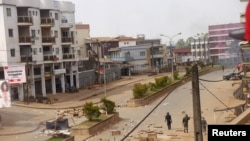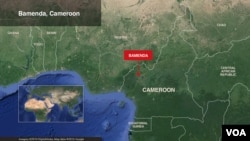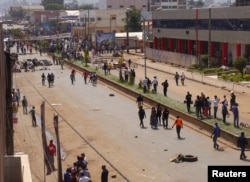The strike by English-speaking professionals in Cameroon has taken another turn with the government shutting down an independent radio station. The station hosted a discussion of what the striking lawyers and teachers say is the overbearing use of French in the bilingual country.
Cameroon is officially a bilingual country but only about a fifth of the population speaks English. Professionals in anglophone parts of the country complain that English is being sidelined. For example, they say the government has failed to provide official documents in English as well as French.
Teachers are also demanding reforms amid what they say is the proliferation of French-oriented schools. However, the months-long strike has actually pushed some families in affected areas to move their children to French-speaking schools so they won’t miss the academic year.
Radio Hot Cocoa is based in Bamenda in Cameroon’s northwest region, the center of the strike by English-speaking lawyers and educators.
Authorities sealed the station’s offices Thursday, after a call-in program in which participants criticized the government over its handling of striking professionals’ grievances.
VOA reached the manager of Radio Hot Cocoa, Gideon Taka, by phone.
"The governor’s office accused us of broadcasting information that could incite the public to violence, incite the public to hatred, and incite the public to civil disobedience,” he said.
Taka said the region’s governor is mad that the show’s hosts took the side of the callers, not the government, during the live debate.
Activists say the radio shutdown is part of a wider clampdown on public debate in Cameroon.
Restrictions on media
At least 20 journalists and dozens of media outlets were suspended last year. In December, the minister of communication ordered radio and TV stations to stop round table discussions and call-in programs.Talk shows on state media that examined topical issues were suspended.
As for the strike, English-speaking lawyers and teachers have refused to work since October, effectively bringing the justice and education systems to a halt in the northwest and southwest.
The situation degenerated in December when youths set fire to police stations and vehicles and burned a national flag. Several hundred people have been arrested.
Negotiations to end the strike deadlocked over two issues. The government has released about 50 of the people who were detained, but has refused to release them all. And some union leaders called for the English-speaking parts of Cameroon to seek independence.
Professor Ghogomo Paul Mingo, chief government negotiator in the teachers’ grievances, wants to get talks back on track.
"The government cannot negotiate anything that has to do with the form of the state, but every other thing they can bring to the table," he said. "The ad-hoc committee which I head is still ready to welcome the six leaders of the trade union who left the hall."






